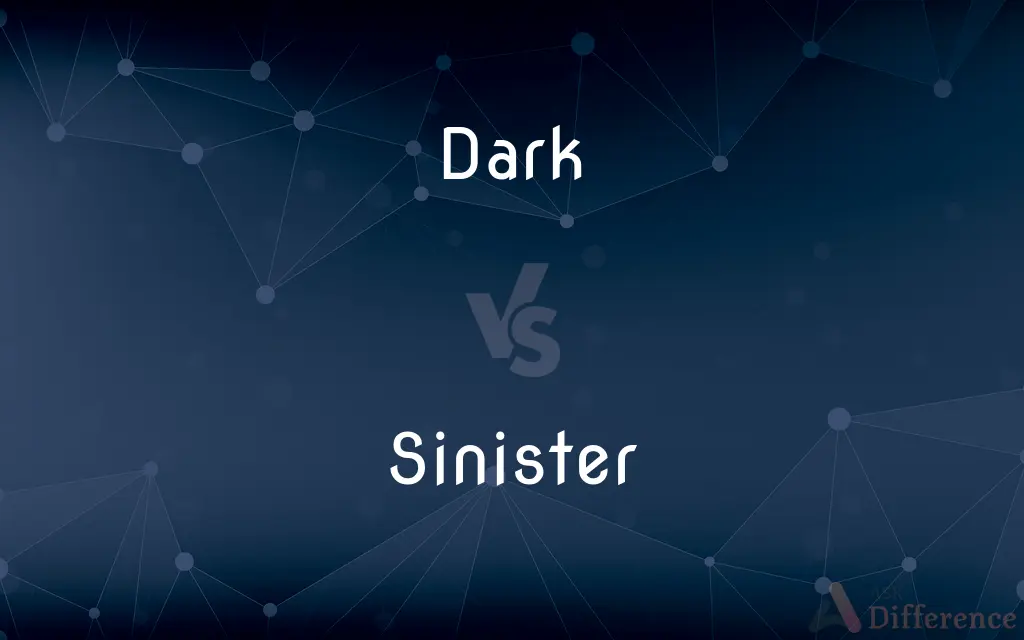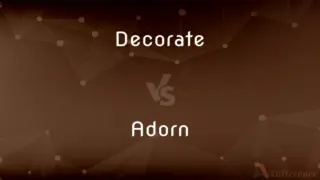Dark vs. Sinister — What's the Difference?
By Fiza Rafique & Maham Liaqat — Updated on May 13, 2024
Dark often refers to a lack of light or deep shade, while sinister suggests an ominous, evil quality or impression.

Difference Between Dark and Sinister
Table of Contents
ADVERTISEMENT
Key Differences
Dark generally denotes an absence or minimal presence of light, making it difficult to see. Whereas, sinister carries connotations of malevolence, danger, or ill intent, often used to describe an atmosphere or a character’s motivations.
In common usage, dark can describe anything from a physical space with little to no illumination to a color that is close to black. On the other hand, sinister is frequently applied in a figurative sense to describe actions, thoughts, or narratives that have a morally dubious or threatening aspect.
Dark can have neutral or even positive connotations depending on the context, such as "dark chocolate" or "dark skies for stargazing." Whereas sinister almost always implies something negative and fear-inducing, reinforcing a sense of impending harm or evil.
The aesthetic of dark is often embraced in fashion and art to convey mystery, depth, or sophistication. In contrast, sinister is used to evoke a deliberate sense of horror, unease, or foreboding in literature, cinema, and other forms of art.
In psychology, dark can refer to aspects of personality that are hidden or suppressed, like in the term "dark secrets." Whereas, sinister is used to describe actions or characteristics that are not just hidden but inherently evil or harmful.
ADVERTISEMENT
Comparison Chart
Basic Meaning
Lack of light; very shaded
Evil, ominous, threatening
Usage in Speech
Neutral or positive
Almost always negative
Example Contexts
Physical spaces, colors
Actions, motivations
Emotional Connotation
Mysterious, unknown
Threatening, dangerous
Common Phrases
Dark room, dark colors
Sinister plot, sinister motives
Compare with Definitions
Dark
Lacking light.
It was so dark outside that I couldn't see the road.
Sinister
Harmful or deceitful.
They uncovered the sinister plans of the corporation.
Dark
Morally complex.
The novel explores the dark side of human nature.
Sinister
Evil or malevolent.
The villain's motives were purely sinister.
Dark
Lacking or having very little light
A dark corner.
Sinister
Threatening or dangerous.
There was a sinister look in his eyes.
Dark
Lacking brightness
A dark day.
Sinister
Left-handed (archaic or less common).
In ancient times, being left-handed was considered sinister.
Dark
Reflecting only a small fraction of incident light; tending toward black
Dark clothing.
Sinister
Suggesting or threatening harm or evil
A sinister smile.
Dark
Served without milk or cream
Dark coffee.
Sinister
Causing or intending harm or evil; wicked
A sinister conspiracy.
Dark
Being or having a complexion that is not light in color.
Sinister
Portending misfortune or disaster; ominous
Sinister storm clouds.
Dark
Sullen or threatening
A dark scowl.
Sinister
Attended by or causing misfortune or disaster
"The day has passed without any sinister accident" (John Quincy Adams).
Dark
Characterized by gloom or pessimism; dismal or bleak
A dark day for the economy.
Dark predictions of what lies in store.
Sinister
(Archaic) On the left side; left.
Dark
Being or characterized by morbid or grimly satiric humor.
Sinister
(Heraldry) Situated on or being the side of a shield on the wearer's left and the observer's right.
Dark
Unknown or concealed; mysterious
A dark secret.
The dark workings of the unconscious.
Sinister
Inauspicious, ominous, unlucky, illegitimate (as in bar sinister).
Dark
Lacking enlightenment, knowledge, or culture
A dark age in the history of education.
Sinister
Evil or seemingly evil; indicating lurking danger or harm.
Sinister influences
The sinister atmosphere of the crypt
Dark
Evil in nature or effect; sinister
"churned up dark undercurrents of ethnic and religious hostility" (Peter Maas).
Sinister
(archaic) Of the left side.
Dark
Morally corrupt; vicious
Dark deeds.
A dark past.
Sinister
(heraldry) On the left side of a shield from the wearer's standpoint, and the right side to the viewer.
Dark
Having richness or depth
A dark, melancholy vocal tone.
Sinister
(obsolete) Wrong, as springing from indirection or obliquity; perverse; dishonest.
Dark
Not giving performances; closed
The movie theater is dark on Mondays.
Sinister
On the left hand, or the side of the left hand; left; - opposed to dexter, or right.
My mother's bloodRuns on the dexter cheek, and this sinisterBounds in my father's
Dark
(Linguistics) Pronounced with the back of the tongue raised toward the velum. Used of the sound (l) in words like full.
Sinister
Unlucky; inauspicious; disastrous; injurious; evil; - the left being usually regarded as the unlucky side; as, sinister influences.
All the several ills that visit earth,Brought forth by night, with a sinister birth.
Dark
Absence of light.
Sinister
Wrong, as springing from indirection or obliquity; perverse; dishonest; corrupt; as, sinister aims.
Nimble and sinister tricks and shifts.
He scorns to undermine another's interest by any sinister or inferior arts.
He read in their looks . . . sinister intentions directed particularly toward himself.
Dark
A place having little or no light.
Sinister
Indicative of lurking evil or harm; boding covert danger; as, a sinister countenance.
Dark
Night; nightfall
Home before dark.
Sinister
Threatening or foreshadowing evil or tragic developments;
A baleful look
Forbidding thunderclouds
His tone became menacing
Ominous rumblings of discontent
Sinister storm clouds
A sinister smile
His threatening behavior
Ugly black clouds
The situation became ugly
Dark
A deep hue or color.
Sinister
Stemming from evil characteristics or forces; wicked or dishonorable;
Black deeds
A black lie
His black heart has concocted yet another black deed
Darth Vader of the dark side
A dark purpose
Dark undercurrents of ethnic hostility
The scheme of some sinister intelligence bent on punishing him
Dark
Darks Pieces of laundry having a dark color.
Sinister
On or starting from the wearer's left;
Bar sinister
Dark
Having an absolute or (more often) relative lack of light.
The room was too dark for reading.
Sinister
Ominous or foreboding.
The silence in the house was sinister.
Dark
(of a source of light) Extinguished.
Dark signals should be treated as all-way stop signs.
Dark
Deprived of sight; blind.
Dark
Transmitting, reflecting, or receiving inadequate light to render timely discernment or comprehension: caliginous, darkling, dim, gloomy, lightless, sombre.
Dark
(of colour) Dull or deeper in hue; not bright or light.
My sister's hair is darker than mine;
Her skin grew dark with a suntan
Dark
Ambiguously or unclearly expressed: enigmatic, esoteric, mysterious, obscure, undefined.
Dark
Marked by or conducted with secrecy: hidden, secret; clandestine, surreptitious.
Dark
Without moral or spiritual light; sinister, malign.
A dark villain;
A dark deed
Dark
Conducive to hopelessness; depressing or bleak.
The Great Depression was a dark time;
The film was a dark psychological thriller
Dark
(of a time period) Lacking progress in science or the arts.
Dark
Extremely sad, depressing, or somber, typically due to, or marked by, a tragic or undesirable event.
September 11, 2001, the day when four terrorist attacks destroyed the Twin Towers and the Pentagon, is often referred to as America's dark day.
Dark
With emphasis placed on the unpleasant aspects of life; said of a work of fiction, a work of nonfiction presented in narrative form, or a portion of either.
The ending of this book is rather dark.
Dark
Off the air; not transmitting.
Dark
A complete or (more often) partial absence of light.
Dark surrounds us completely.
Dark
(uncountable) Ignorance.
We kept him in the dark.
The lawyer was left in the dark as to why the jury was dismissed.
Dark
(uncountable) Nightfall.
It was after dark before we got to playing baseball.
Dark
A dark shade or dark passage in a painting, engraving, etc.
Dark
(intransitive) To grow or become dark, darken.
Dark
(intransitive) To remain in the dark, lurk, lie hidden or concealed.
Dark
(transitive) To make dark, darken; to obscure.
Dark
Destitute, or partially destitute, of light; not receiving, reflecting, or radiating light; wholly or partially black, or of some deep shade of color; not light-colored; as, a dark room; a dark day; dark cloth; dark paint; a dark complexion.
O dark, dark, dark, amid the blaze of noon,Irrecoverably dark, total eclipseWithout all hope of day!
In the dark and silent grave.
Dark
Not clear to the understanding; not easily seen through; obscure; mysterious; hidden.
The dark problems of existence.
What may seem dark at the first, will afterward be found more plain.
What's your dark meaning, mouse, of this light word?
Dark
Destitute of knowledge and culture; in moral or intellectual darkness; unrefined; ignorant.
The age wherein he lived was dark, but heCould not want light who taught the world to see.
The tenth century used to be reckoned by mediæval historians as the darkest part of this intellectual night.
Dark
Evincing black or foul traits of character; vile; wicked; atrocious; as, a dark villain; a dark deed.
Left him at large to his own dark designs.
Dark
Foreboding evil; gloomy; jealous; suspicious.
More dark and dark our woes.
A deep melancholy took possesion of him, and gave a dark tinge to all his views of human nature.
There is, in every true woman-s heart, a spark of heavenly fire, which beams and blazes in the dark hour of adversity.
Dark
Deprived of sight; blind.
He was, I think, at this time quite dark, and so had been for some years.
Dark
Absence of light; darkness; obscurity; a place where there is little or no light.
Here stood he in the dark, his sharp sword out.
Dark
The condition of ignorance; gloom; secrecy.
Look, what you do, you do it still i' th' dark.
Till we perceive by our own understandings, we are as much in the dark, and as void of knowledge, as before.
Dark
A dark shade or dark passage in a painting, engraving, or the like; as, the light and darks are well contrasted.
The lights may serve for a repose to the darks, and the darks to the lights.
Dark
To darken; to obscure.
Dark
Absence of light or illumination
Dark
Absence of moral or spiritual values;
The powers of darkness
Dark
An unilluminated area;
He moved off into the darkness
Dark
The time after sunset and before sunrise while it is dark outside
Dark
An unenlightened state;
He was in the dark concerning their intentions
His lectures dispelled the darkness
Dark
Devoid or partially devoid of light or brightness; shadowed or black or somber-colored;
Sitting in a dark corner
A dark day
Dark shadows
The theater is dark on Mondays
Dark as the inside of a black cat
Dark
(used of color) having a dark hue;
Dark green
Dark glasses
Dark colors like wine red or navy blue
Dark
Brunet (used of hair or skin or eyes);
Dark eyes
Dark
Stemming from evil characteristics or forces; wicked or dishonorable;
Black deeds
A black lie
His black heart has concocted yet another black deed
Darth Vader of the dark side
A dark purpose
Dark undercurrents of ethnic hostility
The scheme of some sinister intelligence bent on punishing him
Dark
Causing dejection;
A blue day
The dark days of the war
A week of rainy depressing weather
A disconsolate winter landscape
The first dismal dispiriting days of November
A dark gloomy day
Grim rainy weather
Dark
Secret;
Keep it dark
The dark mysteries of Africa and the fabled wonders of the East
Dark
Showing a brooding ill humor;
A dark scowl
The proverbially dour New England Puritan
A glum, hopeless shrug
He sat in moody silence
A morose and unsociable manner
A saturnine, almost misanthropic young genius
A sour temper
A sullen crowd
Dark
Lacking enlightenment or knowledge or culture;
This benighted country
Benighted ages of barbarism and superstition
The dark ages
A dark age in the history of education
Dark
Marked by difficulty of style or expression;
Much that was dark is now quite clear to me
Those who do not appreciate Kafka's work say his style is obscure
Dark
Having skin rich in melanin pigments;
National Association for the Advancement of Colored People
The dark races
Dark-skinned peoples
Dark
Not giving performances; closed;
The theater is dark on Mondays
Dark
Deeply shaded.
She prefers dark colors for her interior decor.
Dark
Secretive or unknown.
He keeps his intentions dark and mysterious.
Dark
Sombre or gloomy.
The film's dark themes made it profoundly moving.
Common Curiosities
What are typical contexts where 'dark' might be used?
Dark can describe physical darkness, mood, themes in art, and colors.
Is 'sinister' ever used in a positive context?
Sinister almost invariably carries a negative implication.
What are typical contexts where 'sinister' might be used?
Sinister is used to describe atmospheres, actions, or characteristics that suggest evil or harm.
How does the emotional impact of 'dark' differ from 'sinister'?
Dark can evoke mystery or depth, while sinister implies a clear threat or evil.
Can both terms be used to describe a personality?
Yes, but dark usually refers to hidden aspects, whereas sinister suggests harmful traits.
Can 'dark' have positive meanings?
Yes, dark can have neutral or positive connotations like in "dark chocolate."
Are 'dark' and 'sinister' interchangeable in literature?
They can be, depending on context, but sinister always adds an element of malevolence.
What is a common literary use of 'sinister'?
Sinister is typically used to introduce elements of evil or imminent danger in narratives.
What is a common literary use of 'dark'?
Dark is often used to set up a foreboding or mysterious mood in stories.
How do the origins of 'dark' and 'sinister' differ?
Dark comes from Old English, denoting lack of light, while sinister comes from Latin, originally meaning 'left' but evolved to mean evil.
Share Your Discovery

Previous Comparison
Hebrew vs. Yiddish
Next Comparison
Decorate vs. AdornAuthor Spotlight
Written by
Fiza RafiqueFiza Rafique is a skilled content writer at AskDifference.com, where she meticulously refines and enhances written pieces. Drawing from her vast editorial expertise, Fiza ensures clarity, accuracy, and precision in every article. Passionate about language, she continually seeks to elevate the quality of content for readers worldwide.
Co-written by
Maham Liaqat












































